Option Choices & SIMS Options
Options information for 2026-27
Here you will find all the information you need to help support you with your option choices in years 8, 9 and 10.
Our virtual options evening for year 8 families will be held on Wednesday 14th January 2026. A letter will be sent out at the start of January with all information needed to support you/your child with their options choices.
Year 8 parents' evenings will be held on Monday 19th and Tuesday 20th January 2026; a letter will be sent to families and you will find a copy in the parents' evening section of our website (under the parents & carers tab). Please click here to visit the parent and carer evenings (PACEs) section.
The deadline for options, to be completed in SIMS Student, is the Friday before the February half term break. Parents/carers MUST approve their child's options via SIMS Parent for them to be accepted.
Option process dates for Jan/Feb 2026-27
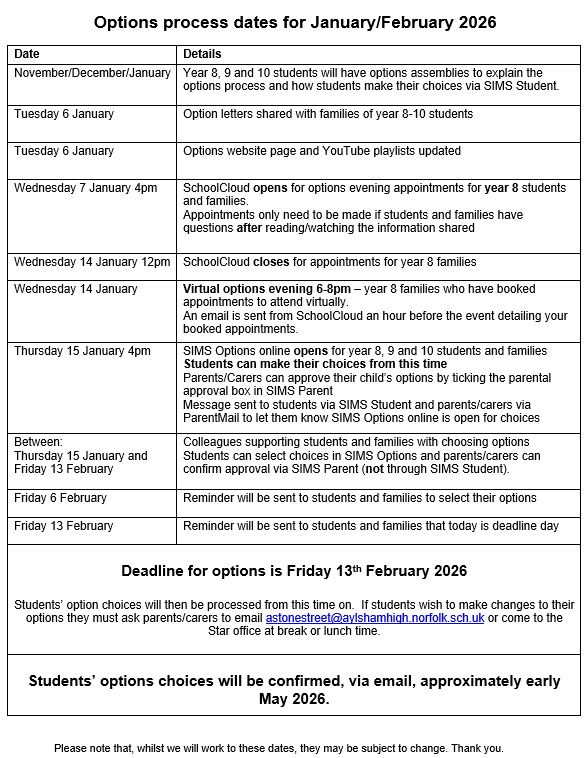
Frequently asked questions (FAQs) about the key stage 4 curriculum for 2026-27
What are key stages 3 and 4?
Students move into key stage 3 in year 7; during this key stage all students study all subjects on the national curriculum. In key stage 4 all students still follow the national curriculum and have therefore to follow the compulsory ‘Core Curriculum’ but they are allowed to choose some option subjects. The transition to key stage 4 happens at the end of year 9 for all Core Curriculum subjects. For other subjects we begin this transition at the end of year 8.
What is the core curriculum at key stage 4?
The national curriculum dictate most of what students should study at key stage 4.
- English
- Mathematics
- Combined science
- Physical education (non-examination)
- Religious studies
- PSHE (personal, social, health and economic education) and citizenship
- Business enterprise (year 9 only)
- Computing (year 9 only)
- French
- Geography or history
Together these subjects are called the compulsory Core Curriculum.
The Core Curriculum 'future proofs' your child’s prospects
While your child may not have decided on their future career path yet, studying the Core Curriculum at GCSE gives them access to a full range of employment options when they leave secondary school and the broad knowledge that employers are looking for.
If they are thinking of going to university the Core Curriculum is also recommended by Britain’s most prestigious universities.
For some students working beneath GCSE-level English and maths level 4 we do offer additional English and maths lessons at foundation level (grades 1-3) instead of French. We will look at students’ progress to decide if these lessons would be beneficial for a student; this is not a route a student can opt into however, if a student would prefer to continue with French, they can of course do this.
How does the GCSE grading system work?
From 2017 GCSEs were reformed. The new grading structure now ranges from 9-1, where 9 is high pass and 1 a low pass. Ofqual have stated that the same number of students will be awarded a grade 4 or above that used to be awarded a grade C or above. However, the government is keen to see the good pass grade rise from a 4 to a 5. The graphic below helps to see the other points on the scale where comparisons can be drawn with the old style A*-G grading system.
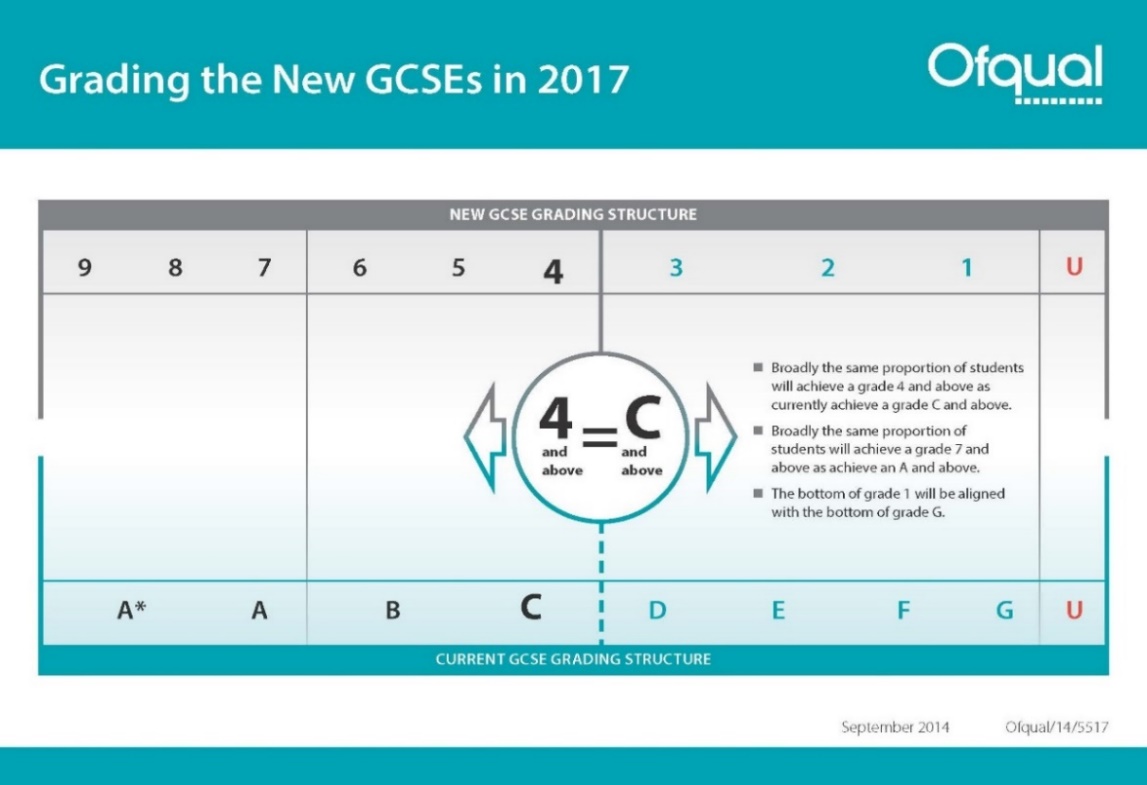
What else is different about new style GCSE?
New style GCSEs are very different to the qualifications that they replaced. They have been designed to be more rigorous, have more content and to be assessed through more formal methods. Gone from the majority of GCSEs are coursework, controlled assessment and module examinations. Where controlled assessment remains, for example in technology subjects, it is not worth as many marks as it used to be and there will always be a formal terminal examination. If students are to achieve high pass grades they must therefore become expert at the learning and recalling of core knowledge and applying this knowledge to the course in an exam situation. Teachers have produced core knowledge questions and answers to help with this and many successful students use parents and other family members to help them learn this knowledge. Once that has been done past paper questions then need completing to ensure this knowledge can be applied correctly.
How do students best succeed at GCSE?
Every year we see students that have struggled in school, up until they have started their GCSE courses, achieve levels of success they thought were beyond them. Success at GCSE level is not defined by the intelligence we were born with; it is much more closely linked to the way we work. Successful students more often than not have these 4 things in common:
- They try hard in lessons. For example: they are organised, start work quickly, try and complete every task to the best of their ability and ensure that their behaviour does not affect their, or other students’, learning.
- They ask questions when they are stuck. This is crucial. The most successful students often ask the most questions. If you are stuck you are wasting time, if asking a question gets you working again then you are learning. Asking questions can also help the teachers to show which information has, or has not, been understood.
- They complete their homework to the best of their abilities. Research has shown that students who complete more homework go on to achieve better grades.
“The amount of time students said they spent on homework predicted better academic attainment and progress (strongest effects for 2-3 hours on a typical weekday evening). Students who spent more time on homework during year 11 were almost 10 times more likely to achieve 5 grades 9-4 than those who did less homework.”
There will be more homework with GCSE courses. Teachers will set your child homework and give core knowledge to learn. Your child needs to find time in their schedule to complete this. If there is no homework set then they can use the time to learn and revise core knowledge. It can work really well when parents/carers test their child at home on this core knowledge. If homework isn’t being set then please contact the school.
- They attend school every day. Again this has been nationally researched; last year the children that attended their schools more often got higher GCSE grades. We all get ill and we shouldn’t feel bad about taking the time to get better. However, we should try and attend whenever possible. The highest grades are more often than not attained by students with over 95% attendance; national data indicates that students in the highest attendance bands can achieve nearly a whole GCSE grade higher than students whose attendance falls in to the lowest attendance band.
What is combined science?
Combined science is worth two GCSEs (which meets the requirements of the Core Curriculum) and is comprised of equal amounts of biology, chemistry and physics. All science A Level specifications assume that students will have studied combined science at GCSE.
If students choose to study separate sciences as one of their options this will provide them with individual GCSEs in each of the sciences and this would ease the transition to A Level studies. We would therefore advise any student that might aspire to study any science at A Level to choose separate sciences as one of their options.
How is PSHE (personal, social, health and economic education) and citizenship taught?
Students will be taught PSHE and citizenship through activities in form time, assemblies and occasional days when their timetable will be collapsed (this means they will come out of their normal timetabled lessons to take part in larger group activities).
Why do we have mixed age teaching in options at key stage 4?
Mixed age teaching will only happen in the option subjects; students will be taught in their current sets (with the usual minor alterations) for all their core subjects. We hope that teaching the option subjects in mixed age groups will have two main benefits for students. Firstly, it will mean many more students get their first choice option subjects. When questioned, under the old system of option blocks, only half of our year 9 would have been able to study the combination of subjects that they were most interested in. Secondly, because more students are involved in the options process, we will be able to offer more choice. Since introducing this curriculum model we have managed to add GCSEs in business and computing, Vocational Awards in music and ICT and a Cambridge National qualification in health and social care.
What are Vocational Award qualifications/ Cambridge Nationals?
Vocational Awards/Cambridge Nationals are work-related qualifications suitable for a wide range of students, built to accommodate the needs of employers and allow progression to university. They are recognised by schools, colleges, universities, employers and professional bodies across the United Kingdom and in over 100 countries worldwide. They provide a practical, real-world approach to learning without sacrificing any of the essential subject theory. The other key difference of these courses is that the students are assessed throughout the course with a smaller exam compared to GCSE. Students are expected to continuously add to a portfolio of evidence with a formal assessment (exam). Vocational Awards do not count towards the English Baccalaureate and are not good foundations to A Levels in those subjects; for example you would not be able to do an A level in chemistry after studying BTEC science. However, many colleges do offer BTEC level 3 qualifications and they are an excellent qualification for many of our students.
Will having mixed age groups increase the ability spread within the room and make it more difficult for the teacher?
We believe that, rather than age being the most critical factor that we should concentrate on, we should look at a student’s ability and work ethic. We know there can be a large difference in the ability range of a year group so if we are really going to meet our students’ needs we need to put on a greater range of courses. Our system makes this possible because of the increased numbers of students choosing. This will hopefully mean that the ability range in the groups becomes narrower and not wider. We have also found that year 9 students that approach GCSEs seriously and try their best often outperform older students that, on paper, have a higher ability but are not working as hard.
If a student undertakes a GCSE in year 9 surely they will not do as well as if they took it in year 11?
The question of how can different aged students learn at the same rate is one that we spent a lot of time researching in other schools that were already running this type of curriculum. Maturity obviously counts against year 9 students, but in their favour is that they are only working towards GCSEs in 1 subject. Whereas the year 10 and 11 students also have the demands of GCSEs in the core subjects placed upon them.
Also, students perform better in subjects that they are interested in so if we can offer them this chance hopefully the students will be more motivated to succeed. Previously our students saw year 9, as it used to be, as less useful because lots of them felt ready for the next step and research states that if students are challenged their level of work rises. Since the introduction of this curriculum model our year 9 students have worked extremely well in their options. Results are in line with what we would expect and in some cases better. If a student has not taken to GCSE work in year 9 we do have the option of postponing the assessment of that option until the following year and for some of our students this has been very useful.
When will students obtain their GCSE results if they complete a course in year 9?
Students will receive their results in August of that year. This gradual accumulation of qualifications we also see as a good thing because students will be able to apply for post 16 courses in year 11 with a real idea of the level they are capable of working at and with excellent evidence to back up that application process. It also spreads the load which will be advantageous when students are in year 11.
If a student completes a course in year 9 how will they be able to take an A Level in it at sixth form if they have had a 2 year break in study?
The question of progression was probably the most asked by parents when we introduced this model. We therefore spent a lot of time looking into this when designing this model. There are two answers we can offer; the first is that 52% of students in further education study courses that they have never studied before and are very successful at them. The important thing is for students to learn the necessary skills. Secondly, because we have more subjects on offer students have often benefitted from taking a similar subject within their interest area. For example: art and graphics, Vocational Award in ICT and computing.
When are exams taken for the core subjects?
Exams in the core subjects are taken at the end of year 11.
When will the teaching of the options start?
The year will begin in June because that is when the GCSE examinations finish and we want to give students the maximum amount of time in their chosen option. This means that towards the end of year 8, mid-June, our timetable for the whole school will ‘rollover’ to the new academic year; we will issue new timetables to students with their core year 9 classes and option subjects.
options explained and example timetables
Options are studied over three years and this diagram shows how your options will look in each year.
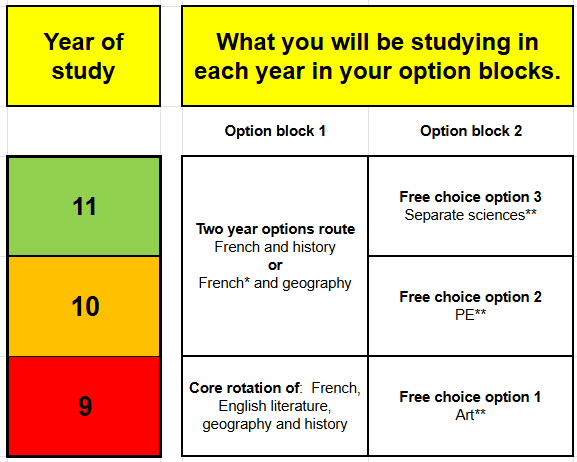
* A small number of students will study a pathway of a humanity with extra English and maths, in place of French. Students will be selected for this 'humanities' pathway by the Head of French. Students can choose to continue with the French pathway if they wish.
** These subjects are examples only and the full list of subjects can be found in the next section.
Our options are studied on Tuesdays and Thursdays over a 2-week timetable. Students in year 9 will undertake the Core subjects (French, English Literature, geography and history) during one option block and a 1 year 'free choice' option in the other block (art is the example subject shown below).
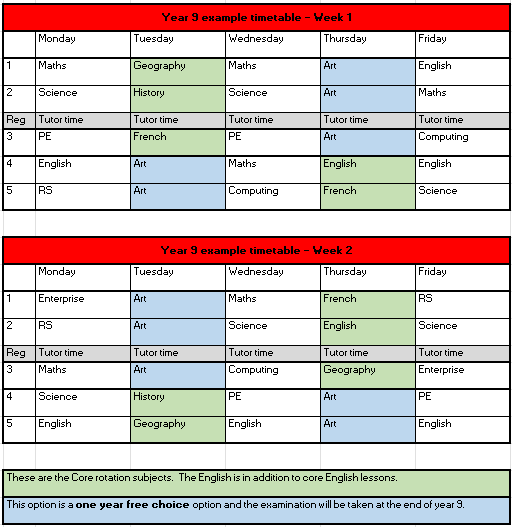
In year 10 students will then study their 2-year Core route of French* alongside history or geography. They will then study a further 1 year 'free choice' option in the other option block (PE is the example subject shown below).
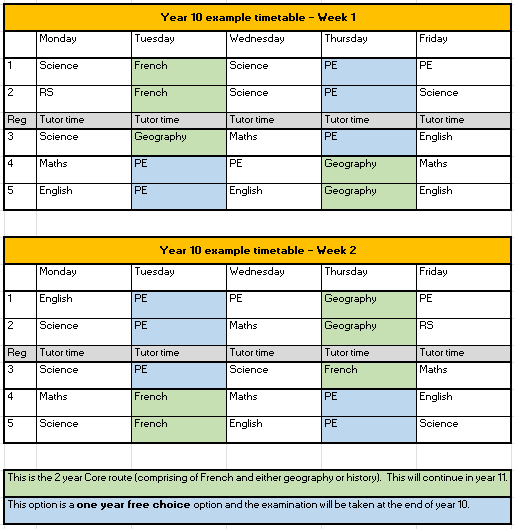
In year 11 students will then continue with 2-year Core route of French alongside history or geography. They will then study a further 1 year 'free choice' option in the other option block. (Separate sciences is the example subject shown below and this will be in addition to core science lessons).
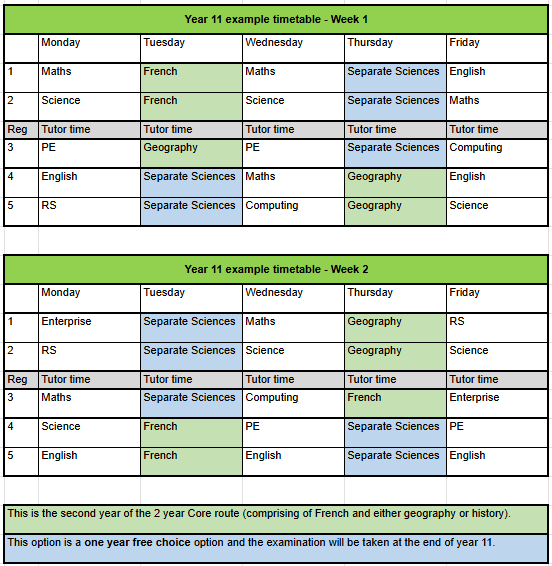
Please note that when students have their options confirmed this will not show which option 'block' they will study them in. This will only be confirmed at the point of timetables being produced. Students will not therefore know who will be in their options subject classes with them and we will not be able to provide this information prior to timetable printing.
Options subjects at AHS 2026-27
Below is a list of the option subjects on offer at Aylsham High School. These courses are taken in years 9, 10 and 11. Option lessons take place on a Tuesday and Thursday. The level of the course is highlighted in bold. We are unable to guarantee which year an option will be assigned.
Subjects available will be dependent on the pathway which students have been assigned to, allocated prior to choosing options, therefore some subjects may not be available for all students to take.
It is important to think carefully about these choices. We do ask students to review their choices every year but, if classes become full, we always give priority to students who originally chose a subject.
Further options information can be found here : Option Choices & SIMS Options - Aylsham High School
If you have any questions please speak to a member of staff in the STAR office, which is located in the main school corridor.
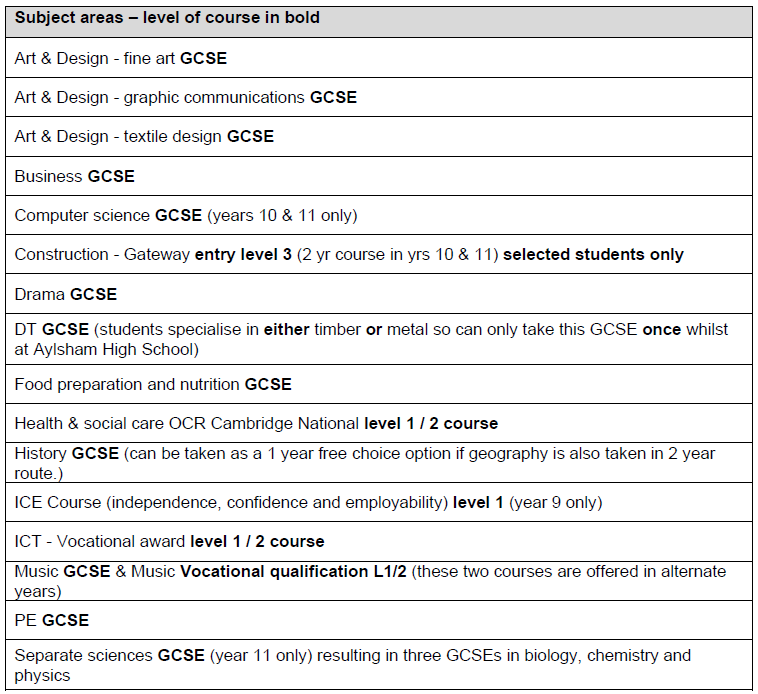
options booklet 2026-27
The options booklet has information on:
- Understanding the options process
- Staff who can help with choosing your options
- Explanation of the different qualifications
- The core curriculum
- Core subjects
- Options subjects
All the options subjects have a link to a video and a QR code which provides more information about the subject content and requirements of the courses.
The options booklet will be updated each January
Options Booklet 2026-27Options evening information and presentations 2026-27
Our options evening is a virtual event with appointments booked, via SchoolCloud, in a similar way to parent and carer evenings (PACEs).
We will send out a letter to all year 8 families each January with a full explanation of the event.
The letter you receive will indicate which pathway your child will be following for their year 9 options and therefore which presentation you need to watch.
- Mr Brockington's presentation for Core pathway - please click here to watch the videos
- Mr Sweatman's presentation for Foundation pathway - please click here to watch the video
There will also be a link to the options booklet which has information on each options subject and links to subject videos to watch.
If you then have any questions, which have not been answered by the presentations or subject information/videos, you can make appointments to speak to subject staff at the options evening. Both Mr Brockington and Mr Sweatman will be available to answer general options questions about the process. Subject staff will be able to answer more specific questions regarding their course content and topics studied.
Students can speak with subject staff, during breaks and lunchtimes, if they have any questions about their subjects. They can also come to the star office (opposite the staff room on the main corridor) and speak to any staff there about the options process.
option choices that students need to make
Each January we ask all students in years 8, 9 and 10 to select options. We understand that some students may want to change their minds about their choices over the year so we ask the year 9 and 10 students to reconfirm options each year.
The information below explains what students will need to do each January:
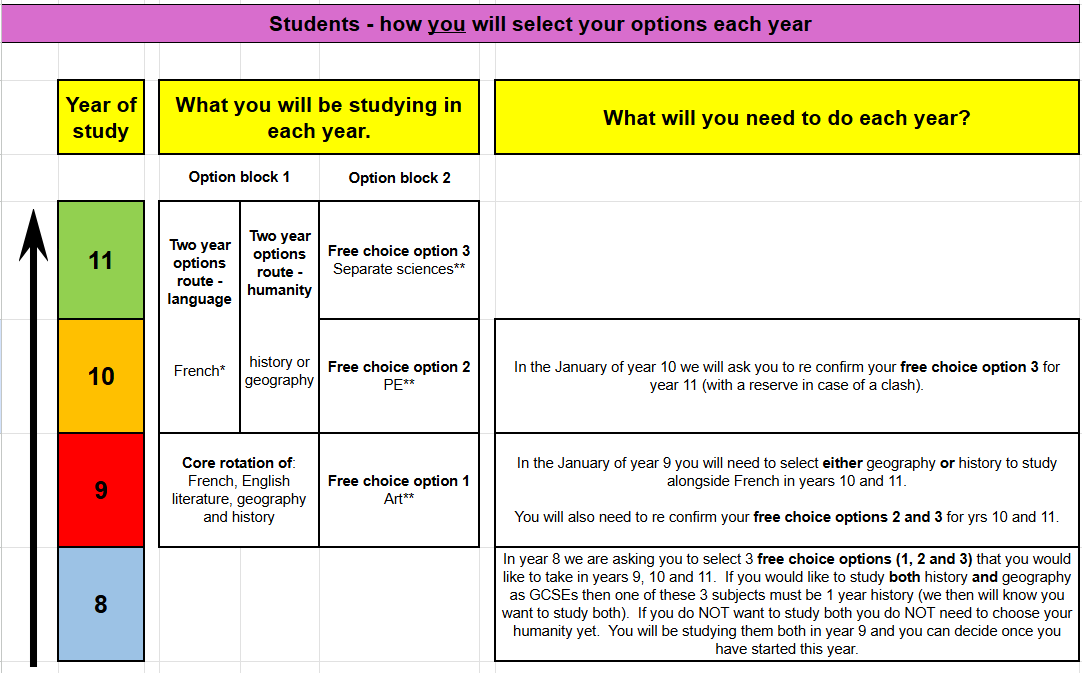
How will we assign options to you?
Year 8 students (going into year 9)- We will assign you one of your free choice options to study in year 9 (but NOT the humanity if you have chosen this as you will still be studying these in your rotation subjects). We will try and follow your year preferences but this is not always possible. You must therefore only select options you are willing to study.
Year 9 students (going into year 10) - We will assign you your chosen humanity to be taught in both years 10 and 11. We will also assign you one of your two free choice options for year 10. We will try and follow your year preferences but this is not always possible.
Year 10 students (going into year 11) - We will assign you your final free choice option. If this creates a clash we will contact you to discuss possible solutions.
completing option choices VIA SIMS Options
We ask that all students complete their options choices via SIMS Options.
Year 8 parents/carers and students will be invited to a 'virtual' options evening in January, via a letter, which will have links to presentation videos explaining the options process and how to make your choices.
We also provide an options booklet, with links to subject videos, to help support with making choices. Students can also speak to departmental staff, during breaks or lunchtimes, if they have any questions about their courses.
Further support for SIMS Student can be found here: SIMS Student - Aylsham High School
Information about using SIMS Options via SIMS Student and SIMS Parent can be found here: SIMS Options YouTube Playlist
Parents/carers will be required to approve their child's options via SIMS Parent before we can accept the choices from students. Support can be given to access SIMS Parent if required.
Please note - a student can select their options in both SIMS Student and SIMS Parent but options can ONLY be approved via SIMS Parent.
Useful links for making options choices
